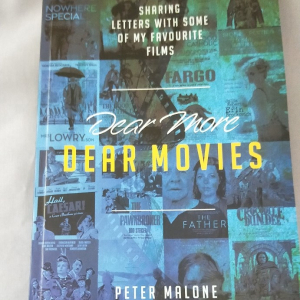Peter MALONE
Unhuman
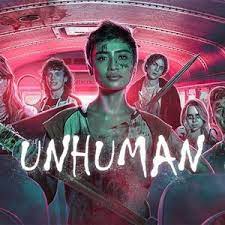
UNHUMAN
US, 2022, 90 minutes, Colour.
Brianne Tju, Benjamin Wadsworth, Uriah Shelton, Ali Gallo, Peter Giles, Drew Scheid, Josh Mikell, Lo Graham, CJ LeBlanc, Blake C.Burt, Tony Donno.
Directed by Marcus Dunstan.
Unhuman begins like a typical high school comedy with some edge. A group of teenagers gather for an outing, the opening of the film establishing some of these characters, especially two friends, Ever and Tamra. The teacher checks on everyone, the bus driver is ready, quite a number of other students arrive, especially the local Jock, Danny, and his girlfriend, two students who have been bullied, and a rather large boy.
All seems ordinary enough, banter and slinging off during the trip – and suddenly, blood on the windscreen, panic, attempts to escape the bus, and strange zombielike creatures advancing, taking over the bus driver and transforming him.
Young horror fans, especially those identifying with the characters, will enjoy this variation on zombie themes.
There is a lot of hectic action, pursued by the zombies, gathering together in a hut for protection, working out tactics, the transform driver attacking them, also a transformed fellow student. Alliances are made, many clashes, the large boy intervening and helping them…
Ultimately, there are explanations, especially in the flashback where the bullied boys concoct a whole plan for this scenario, another one with the drug injected into the students to make them bewildered and fearful. The Jock becomes the target of the zombies. The two girls who had begun to fall out with each other are reunited.
The school authorities take over and the boys who concocted the plot are put in prison – later to be approached by the school authorities to create a further scenario!
Parents and teachers may find this story more exasperating but high school students may well identify with the characters and enjoy it, the horrors, the zombies, the peril, the explanations.
Kairos/ Australia
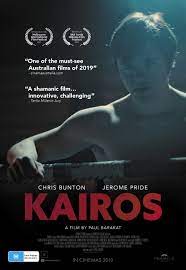
KAIROS
Australia, 2019, 89 minutes, Colour.
Chris Bunton, Jerome Pride, Digby Webster, Deborah Jones, Audrey O'Connor, Jaden Byrne.
Directed by Paul Barakat.
Kairos comes from the Greek, the contrast between chronological time and the special time, the special occasion and opportunity in a person’s life, moment of grace. This is explained by the teacher to his class, urging them to dream.
This is a small-budget film from Sydney, with a Down Syndrome actor, Chris Bunton, in the lead, a young man, Danny. But himself is also a special Olympics champion and studied for five years at NIDA. He is a persuasive screen presence, seen at home with another Down Syndrome friend, fostered by a sympathetic former nurse, played by Deborah Jones. He attends a special class, education, imagination, ideas, lectures and explanations, and imaginative exercises, blindfold, listening to music (many of which are visualised here, especially with Danny wanting to be more normal, like a French boxer). There are scenes between him and the Down Syndrome friend, Ellie.
Danny is a successful gymnast but is interested in boxing. He is encouraged by John (Jerome Pride) who runs the gym. Not everybody is enthusiastic for Danny to be a boxer – and there is a crisis when he punches John while sparring, knocking him out, knocking out his teeth. Danny keeps it secret and broods. John says he fell off a ladder. This creates friction between the two.
John’s story and his family is also filled in, tragic background in England, coming to Australia.
Ultimately, the secret is out, consequences for the friendship, consequences for Danny’s ambitions, complicated by his experiences of blindfold and imagination. While Danny continues to bond with Ellie, he returns to gymnastics but the final image of the film, an empty feeling, is Danny coming down from the rungs and the two just left hanging, empty.
- The meaning of the title? Chronological time, special opportunity time?
- The focus on Down Syndrome, Danny, Sam, Ellie, the various members of the group? Featuring Down Syndrome actors, pride and achievement, reaction of the public, reactions, underlying anger?
- The Sydney setting, the city, homes, the gym, the classroom, buses and trains, dentists…? Authentic feel? The musical score?
- Danny’s story, his age, Jude and the story of his birth, the birth mother, Jude and her care for Danny, fostering, over the years, the details of their life, at home? Sam, his place in the house, relationship with Danny? Support, clashes? The attraction to Ellie, the conversations, recounting stories, dreams? The finale together?
- Danny and his achievement, gymnast, conscious of his Down Syndrome, yet articulate, achievement? Interest in boxing, background explanations, going to the gym, the friendship with John? John and his background story, England, tragedy? The discussions, John and his encouragement? Jude and others being wary about the boxing? The training, the spa, the dramatic impact of Danny knocking out John, the loss of the tooth?
- The consequences, Danny, upset, the secret, with the tooth? John, saying he fell off a ladder, going to the dentist, the process of the teeth, the grounds, the gold tooth? Sam, the painting of The Tooth Fairy, the tooth? Danny and the secrecy, cutting off interactions with John?
- John, at home, wife, daughter, family life, at the gym, his past, the relationship with the Frenchman? Encouraging Danny, the spa, the knockout, the consequences? Alienation?
- The course for the students with Down Syndrome, theatrical presentation, the lecturer, explanation of Chronos and Kairos, background from the Greeks and philosophy? The exercises, imagination, the music, the blindfold?
- Danny, the blindfold, the music, his imagination, wanting to appear normal, the character of the Frenchman, Ellie in the imagination, the relationship with the Frenchman? The consequences for the imagination?
- Public wariness of Down Syndrome, Danny and the train, friendly, the father with the baby, Danny admiring, the struggle with the father? (And the father portrayed by the writer-director)?
- The situation at home, the revelation of the truth, Danny and his wanting to be a boxer, the encouragement, his skill as a gymnast? Falling out with John – the future with John? The final dream imagery and his imagination? The final sequence of the gymnast, and the rungs hanging?
Time Share/ Tiempo Compartido
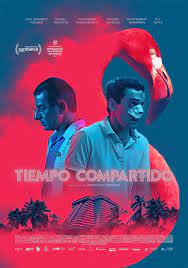
TIME SHARE/ TIEMPO COMPARTIDO
Mexico, 2018, 96 minutes, Colour.
Luis Gerard Mendez, Miguel Rodarte, RJ Mitte, Cassandra Ciangerotti, Montserrat Maranon, Andrew Almeida.
Directed by Sebastian Hofman.
The title indicates those resorts where holidaymakers come, renting or buying accommodation, timeshare.
On the one hand, this film can be looked on in terms of realism, while the treatment and perspective is often surreal. While we see a family, father, mother, son, arriving at the Everfields resort, hoping for a happy holiday, especially therapy for the wife who has had some mental trouble, an opportunity of joy for the son, the atmosphere is soon changed when it seems that another family, rather larger, is booked into the same room.
What seems to be a comedy of errors, with numerous apologies, soon becomes something of a critique of capitalism, techniques for persuading customers to buy, staff seminars to train them in persuasion, seminars for the visitors praising the resort – and an attack on American-style capitalism. On the one hand, the wife is happy sharing the experience with the second family, as is the young son. By contrast, the father is enraged, stands his ground, objects, becomes more and more paranoid, reacting badly to the family, to his wife and son, taking his son aside to warn him about the evil of the other family.
There is a prologue to the film focusing on another couple, grief at the death of their baby son, he supervising sports events but having a seizure and collapsing. The transition is to 5 years later when both are working at Everfields, he is a cleaner, still upset, and she having the opportunity to become a persuader in the organisation.
There is a climactic moment when everybody goes to hit the tennis ball and the father is struck in the face, his nose broken – and, disfigured, he does a paranoid rant in front of all the guests and the staff denouncing them.
Some commentators have indicated a similarity of tone, worth considering, with a films of the Greek director. Yorgis Lanthimos, especially the Lobster with its bizarre hotel setting.
- The title, the focus, Everfields and the resorts? The clients, advertising and persuasion?
- A Mexican film, Mexican atmosphere, characters, situations?
- The tone, realism, surrealism, satire, critique, touches of horror?
- The opening, the prologue with the couple, the cave, the challenge to share in grief? The follow-up with the sports, the sack race, the seizure?
- The transition to 5 years later, Pedro and Eva, their son, the car trip, arrival, settling into their unit? Eva, past illness, hope for recuperation? Parents devoted to their son? The management of Everfields?
- The arrival of the family, the double booking, Pedro’s hostile reaction, Eva more sympathetic, the reaction of the management, excuses, apologies? The two families sharing? The new family, the cheerful father, supportive mother, the children, and getting on well with Pedro and Eva’s son?
- Pedro and his reaction, the detail of sharing, on the bed, waking up, the family present, getting their meal, crowded, the family offering seats? The range of personnel and apologies? Pedro becoming more paranoid? His reactions? The culmination in the tennis, everybody’s abilities, Pedro hopeless, being hit, the broken nose, hospital care? The father and his support? His denouncing the family as evil, clutching his son?
- Eva, enjoying sharing, the son, the swimming, dancing, companionship? Pedro scowling?
- The seminars, the American visitor and his speeches? The audiences? The staff seminars and the uniforms? The residents and thus peel for them to timeshare?
- The story of Andres and Gloria, the past, working, Andres and his jobs, Gloria wanting promotion, the memories of the death of their child? The using this in the speeches? Andres and his job, contacting Pedro, giving the information, the revelation that Everfields had documentation about Eva and her health and situation? Gloria, wanting a opportunity?
- The buildup to the climax, Gloria giving the speech, Pedro and his intervention, at great length, more and more paranoid, Eva and her reaction, the family and the denunciation?
- The future for the family?
- The focus on capitalism, American enterprise, advertising, the staff, tricking the clients, the speeches and seminars, persuading the clients?
Arrete avec tes mensonges/ Lie with Me
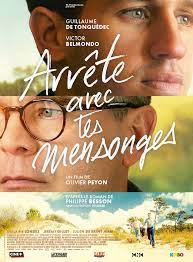
LIE WITH ME/ ARRETE AVEC TES MENSONGES
France, 2022, 97 minutes, Colour.
Guillaume de Tonquedec, Victor Belmondo, Guilaine Londez, Jeremy Gillet, Julien de Saint Jean.
Directed by Olivier Peyon.
Remembrance of Marcel Proust pervaded the watching of this very personal drama, themes of time lost, time remembered, in search of times past, time regained. And, on checking on the Wikipedia entry for the novelist, Philippe Besson, it revealed that he had, indeed, included Proust himself as a character in one of his novels. And the themes of homosexual orientation. The novel and the film are autobiographical.
This is a fine film, a subtle drama with a screenplay that draws the audience in, a story of the present but many flashbacks, memories of 1984, each era continually throwing light on understanding of the two central characters, the past Eliminating the present, the present offering more explanations of the past.
The film opens with the 42-year-old novelist, Stephane Bellcourt, driving to the town where he grew up but had left 35 years earlier. Cognac is the main product of the region and the town is celebrating its bicentenary of production. Stephane has been a prolific novelist, two novels a year, but a recent dry patch, but writing a short story about his town, and the consequent invitation. Stephane is played quietly and effectively by Guillaume de Tonquedec (who more than resembles the novelist in appearance). Stephane is hosted by the local Gaelle, organising his program for the celebrations, book signing, interviews, bicentenary dinner speech. She is played quite strikingly by Guillaine Londez.
As he returns to the town, Stephane begins to remember, age 17, final year at school, quiet, bespectacled, gazing at fellow student, Thomas, who responds but is strongly determined that nobody know about the relationship. They meet in secret – some frank sexual scenes – at the swimming pool, at the lake, then in Stephane’s room at home. These flashbacks are spaced right throughout the running time of this film, culminating in Thomas being photographed by camera enthusiast, Stephane, and then going to Spain to work on his uncle’s farm. Never returning. Stephane then left the town to pursue his writing career.
But, the main drama in the present is complex. Stephane encounters Thomas’s son, Lucas, whom he didn’t know existed. Lucas is eager to meet Stephane and, gradually, the audience learns why, Lucas’ life with his father, sad, tragic, – and Stephane not knowing it. And so, the Proustian titles, time lost, time remembered…
The performances are most persuasive, Victor Belmondo (grandson of Jean-Paul) is Lucas. Jeremy Gillet and Julien de Saint Jean are effective as the younger Stephane and Thomas, and the audience always tantalised by looking at Stephane in the present and trying to connect have the young 17-year-old became this man, and tantalised by the sad knowledge of what happened to Thomas.
The English title is too clever with its pun indicating sexual nuance. But, it is not clever enough in actually translating and communicating the tone of the French title, translated “Stop with your lies” which Stephane reveals is a comment that his mother used to make about his stories, making them up in observing people around him, the equivalent of lies. Ultimately, this is a drama about facing the truth, telling oneself the truth, admitting the truth to others
- The original title, Stephane’s mother’s comment, lies and creating stories? The play on words with the English title, the sexual connotation, but not translating from the tone of the original French?
- The setting, the small town, 1984, 35 years later, the production of cognac, the processes and storage, celebrating the bicentenary? The past, school, swimming pool, the lake, the farm, Stephane’s room? The musical score, songs of the time? 30 years later, hotels, government, the dinner, revisiting the past locations? The musical score?
- The introduction to Stephane, in the car, driving to the town, after 35 years? Age 42, serious, novelist, two novels are year, the dry period, homosexual, relationships and failures, the short story about Cognac? The introduction to Thomas, on the bike, 35 years earlier?
- The structure of the screenplay, based on the novel, Stephane based on the life of the novelist? The framework of 35 years later, 21st-century, the older perspective on the town and characters, the inserts of memory, the flashbacks, 1984? The gradual awareness by the audience of each of the characters, the past eliminating what was happening in the present, the present throwing light on the past? Nuances and subtleties?
- 1984, 17-year-olds, the sexual attraction, Stephane and his shyness, looking at Thomas, Thomas giving him the note, going to the pool, the sexual encounter? Thomas wanting it kept secret? Thomas and his relationship with the other students? The effect on Stephane, smiling, not worried about the secrecy, the encounter in the toilet, the note, going to the lake, the swimming, sex, exhilaration? Thomas coming to Stephane’s room, the contrast with music, style, dancing, Stephane’s mother coming home but going to rest, their not being discovered? The bond between the two, Stephane and love, Thomas and love, not admitting it, Stephane wanting him to say it? The graduation, the lake, the photos? Thomas leaving for Spain, never coming back? Stephane leaving? The cumulative effect of the past and the present and the audience understanding the characters?
- The present, Stephane, 42, 35 years away, his career, living in America, the invitation to come back for the bicentenary, his delay in accepting, break-ups, dry patch, writing the story? The welcome to the town, the character of Gaelle, organising, promotion, her vitality, looking after Stephane, some of the difficulties, his absences, clashing with Lucas, the late-night eating, conversation, eventually telling her the truth? His going to the bookshop, the book signing, meeting Lucas? The reception, going to see Lucas, the confrontation with him? Going to the cemetery, the visit to the grandmother, his speech for the bicentenary, talking about himself, frankly, the truth? (And Lucas saying he would probably right about this also?)
- Lucas, with the American group, in the town, leaving, living in America, with the tours and promotion, his shepherding the group, relationship with them, the tour of the cellars and the barrels, inviting Stephane, Stephane not drinking? His indication that he did not know much about Stephane? At the book signing, the later talks, the confrontation? Stephane discovering that Lucas had initiated the invitation, that he had read everything? The film’s gradual revelation of Thomas and the story of his going to Spain, the marriage, compelled, the birth of Lucas, returning to the village, his wife not wanting to stay and leaving, his departure? Lucas trying to understand, the revelation that his father was lively and smiling only when Stephane was on the television? Lucas challenging his father? Sorting out his study, and the letter from 1984 for Stephane, the explanations? And the tragedy of Thomas, the unhappy life, the shame, sexual orientation, hanging himself?
- The atmosphere of the town, the celebration, pride in the cognac, 200 years, the authorities, the welcome, the comment about gay authors and caution, the celebration, the meal, Stephane late, his speech?
- Stephane, the admission of the truth to Lucas, first love, main love, disappointment with Thomas’s disappearance, sending the photo, Lucas finding the photo and giving it back, the sadness, the cemetery, the light touch in meeting Lucas’s grandmother, the welcome, the touch of reality and humanity?
- The farewell, Lucas and the group, the invitation in America, Stephane and the invitation to Paris, the embrace?
- Time lost, time remembered, regrets, tragedy, resolution?
Stephen Hackett visits in Vietnam
Stephen Hackett visits in Vietnam
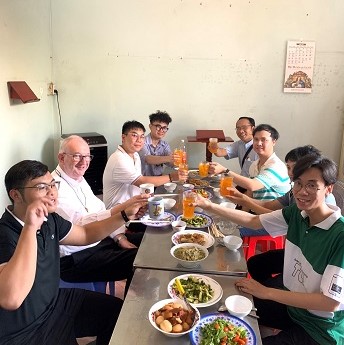
Stephen Hackett returned from Vietnam praising the enthusiasm of our MSC confreres. Some pictures, especially his meeting with those in formation,






He will return next year to follow the recommendation of the Chapter, which is to organise a gathering regarding the current and future Vietnamese MSC Ministry
Acknowledging Joe Ensing MSC, turning 80
Acknowledging Joe Ensing MSC, turning 80

Joe Ensing has a Dutch family background, Queensland, student at Downlands. He made his first profession on February 26th 1963, ordained 31st May 1969.

Golden Jubilee of ordination, with Paul Cashen
Joe has spent most of his over 50 years of priesthood in Papua New Guinea, mission, catechetics, religious education, in recent times, the Community Leader. In a letter for New Years 2021, the Covid times, he wrote about Eastern Papua. It gives some idea of his life in PNG mission:
All continues to go well with me in Papua New Guinea, also known as the land of Paradise and it is surely living up to this name in regard to the Corona Virus Pandemic. My most recent official figures of 10/12/20 country wide is only 8 deaths and 720 confirmed cases out of a population of about 8 million. Even allowing for the low level of testing there are no reports of possible serious outbreaks at present. Our Capital City, Port Moresby has recorded the vast majority of confirmed cases at 360 out of the 16 Provinces, with my home province, Milne Bay at only 2 cases.

Milne Bay
Where ever I go, particularly to town, life is much as usual. Not much evidence of social distancing, and masks only in shops and places of business such as banks, with notices of warnings and advice to avoid the disease.
Pray that we may continue to be spared any major outbreak in this country which has very limited medical resources to cope.
I continue on at our Diocesan Pastoral Centre for the formation and training of local Church lay leaders in a variety of Ministries.
The rest of the time has been at home taking part in short courses and seminars, apart from 3 weeks last month, November, traveling around the islands to the East, from Misima to Rossel, on behalf of the Bishop. I was happy to do this as I spent about 20 years in that area at Nimowa Parish.

He is pictured with his co-author and fellow workers with their book: COUNSELLING BEST PRACTICE (Co-authored Joe Ensing MSC and Sr Valentina Pozzi SdR), TRAINING MANUAL FOR COUNSELLING IN PAPUA NEW GUINEA,
A New Book: Dear More Dear Movies, Peter Malone MSC
A New Book: Dear More Dear Movies, Peter Malone MSC

Back in Covid lockdown days, the cinemas were closed, 2020, from mid-March to mid-November (and some weeks in 2021).
What was a film reviewer to do? Well, for many, Netflix and/or Foxtel was a major answer. The other thing to do was to keep writing on movies. 2020 quietly saw the publication of Dear Movies by Coventry Press – 101 letters to the movies themselves, sharing autobiography with them, the impact they had in their time, later, the issues they raised, Australian themes, religious and spirituality themes.
So lockdown led to more watching and more writing: Dear More Dear Movies, 85 letters this time, the same process: life, issues, themes, spirituality… And Coventry Press again said yes.

This is an endorsement by John Mulrooney MSC: I once wrote to Peter Malone - “you have spent at least one third of your waking hours living in the dark!” “Ah,” said Peter, “but I have had a bright screen in front of me filled with images of life and humanity”. And this is what he writes about in his letters to movies.
I sometimes come out of a movie theatre deeply moved by what I have watched and often have to ask myself: “why was I so moved by this film?”
Peter ties many films to various periods of his own life and personalises his responses to the films. He uses his extraordinary gifts of memory and detail to explore themes that emerge through films: forgiveness, redemption, reparation and so on. (Clint Eastwood’s films) Films such as The Nightingale and The Drovers Wife and other Australian movies evoke the “need to feel and be (and learn to express): sorry.” Films like Six Degrees of Separation remind us “when we connect, we touch the hand of God”.
Peter writes letters to movies that show human life in all its richness, beauty, colour, light, darkness and brokenness. If you love movies, this book is for you.

Haunted Mansion/ 2023
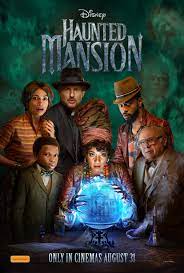
HAUNTED MANSION
US, 2023, 123 minutes, Colour.
LaKeith Stanfield, Rosario Dawson, Owen Wilson, Tiffany Haddish, Danny DeVito, Jamie Lee Curtis, Chase W .Dillon, Jarrod Leto, J.R.Aducci.
Directed by Justin Simien.
This review has been very much influenced by the experience of watching Haunted Mansion at a media preview, reviewers present but also a great number of children with their parents, youngsters.
At the end of the screening, the critics dismissed the film, seeing little value in it, finding it tiresome. And, that is confirmed by a number of reviewers and, checking the bloggers on IMDb, so many dismissing it as boring, unfunny, trite, seen it all before…, critical of Disney for remaking the story.
However, the experience of watching the film was for this reviewer quite different. Quickly becoming conscious of the youngsters in the audience, their responses of delight, especially with the ghosts, the hauntings, the struggles with the ghosts. This was made easy because one of the central characters is a nine-year-old boy, his father dead, his mother wanting to start a new life, their going to the mansion and immediately being haunted and terrified, fleeing, but the ghosts continually dragging them back to the mansion. There were several jump moments which seemed to delight the young audience.
The other thing noted about the young audience was its response to the jokes, to the funny lines, to the humour. Reviewers and bloggers dismiss this as being old hat, obvious, not very funny. But, it would seem that the young audience found these jokes very funny, a lot of out-loud laughter. While the adults may have heard the lines before, maybe this was the first time for the youngsters and they found it all quite funny.
In fact, the film has a strong cast, a very sympathetic LaKeith Stanfield as the sad widower, physicist, dragged into photographing the ghosts with a camera he had been working on. Rosario Dawson is a nice mother and Chase W. Dillon, an engaging nine-year-old. And the film has the comic skills of Danny DeVito as an ageing professor, Owen Wilson as an unconventional (emphasis on the con) priest, Tiffany Haddish as a loud medium and, rather surprisingly, Jamie Lee Curtis as a medium ghost from the past. An unrecognisable Jared Leto is the villain. The director, Justin Simien, has a reputation for satirical film and television, especially Dear White People.
So, an entertainment, PG rated, geared especially for children from 10 to 15 or so who can be accompanied by the parents who may be pleased that the young ones are actually enjoying the haunted mansion and the ghostly hijinks.
1. The Disney theme park? Various film versions? Bringing the theme park ride alive?
2. The Louisiana setting, city of New Orleans, ordinary life, the visualising of the mansion, exteriors, interiors, the ghosts, the special effects, the mansion and surroundings? The visit to the city, the police, the University…? The Crump mansion? The musical score?
3. The focus on Ben, his personality, reticent, science, optics, the encounter with his wife, discussion about ghosts, her tours? Transition to his being down and out, crusty, the tourists, his comments?
4. Gabby and Travis, the U-haul, the mansion, entering, the darkness, Travis and the room, the ghosts, their escaping back to the city?
5. Father Kent, an Owen Wilson character, clerical, deadpan humour, challenging Ben? The offer of the money? Ben going, his camera, pretending to take photos and notes, driving away?
6. The ghosts, appearances, pursuing the characters, forcing them to return to the mansion? Camping in the mansion, the experiences after midnight?
7. Harriet, the medium, dress and style, reputation, self-promotion, conducting the seances, the strange phenomena, the pen and the writing? Her leaving, having to return? The story of Madame Leota, her reputation, wanting to get in touch, finding her head in the globe after unpacking the trunk? Contact with Madame Leota? The silence, Harriet not affected, then entering into the other world?
8. Bruce, age, reputation, never having been to the mansion, wanting to go, his heart condition, the repartee with Father Kent? The discussions, the documents, Father Kent stealing them, Bruce coming to the mansion, trapped?
9. The back story, gradual uncovering, William Gracey, the portrait, suicide, the death of his wife? The gradual revelation about Crump? The change of perspective on the ghosts, 999, their being trapped, Crump needing one more willing human to become a ghost?
10. The seances, Ben and his experiences, the pursuits, getting advice from Gracie, getting onside with the ghosts and their support? The advice of Madame Leota?
11. The human story, Travis, wanting contact with his father, Ben as a father figure, relationship with his mother? Bonding with Ben? Aiming to protect him, his going down the hall, retrieving the hat, in the car, coming out, his involvement? Gabby, her love for her son, protecting him?
12. The stunt work, the chases, the transforming mansion, the ghosts?
13. Father Kent and the truth about his identity?
14. The buildup to the confrontation with Crump, his appearance, hat in the box, diabolical, Ben, his grief, memories of his wife, telling the sad story of her death, his being willing to sacrifice himself? Then turning against Crump, defying him, Crump gradually going down into the grave?
15. The range of personalities of the ghosts, their being onside, helping, the old captain and taking him back to the sea, Gracey and his collaboration?
16. The popularity of the Disney ride, on screen, the target audience of families and youngsters?
There's Something Wrong with the Children
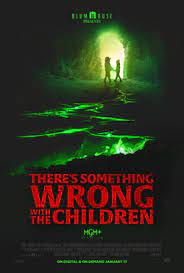
THERE’S SOMETHING WRONG WITH THE CHILDREN
US, 2023, 92 minutes, Colour.
Alisha Wainwright, Amanda Crew, Carlos Santos, Zach Gilford, Briella Guiza, David Mattie.
Directed by Roxanne Benjamin.
A small, quite effective, horror story with sinister children (and memories of Henry James’ The Turn of the Screw and the various film versions).
Two couples go on a holiday, one couple without children intentionally, one couple with two children. They are friends and seem to get on well. One morning they go on a track and discover a cave with a sinister well. The children see a green light.
On the domestic side of the drama, there are themes of friendship, suspicions, infidelity, confession, reconciliation, the unmarried couple offering to mind the children for a night while the other couple has time together. The children disappear. The husband goes searching, especially of the cave, seeing the children, falling into the well. The rest of the film is a blend of tension between the couple’s, especially the husband who is on medication for some kind of mental problems, the couple as parents distraught about their children – and then the children returning, and behaving in a sinister, tormenting manner.
The plot becomes grimmer as it progresses, the husband interacting with the children, the well, falling in, the green light, then the behaviour of the children towards their parents, the husband confronting his wife, inviting her to join the sinister existence with the children.
Effective in its way.
- The title, and its fulfilment?
- The holiday, the holiday house, the couples, one unmarried, the other with children, friendship? The countryside setting, the forest, the cave, the well? The musical score?
- The introduction to each couple, the unmarried couple, careers, work, the bonding, decision about children, desire or not? The couple with children, devotion to the children, the tension within the marriage, the wife and her affair, the husband’s discovery, resolution, reconciliation?
- The night, the unmarried couple looking after the children, the morning, the children disappeared, the husband going in search, to the well, seeing them die? Being distraught, returning, the news? The reaction of the married couple, angry, attack?
- The children reappearing, their eccentric behaviour, a catalogue of mischief, malevolence? Their ages, characters, tormenting the adults?
- The husband, going to the cave, his fall, the shining light, becoming one with the children? The return?
- The children, the reaction of their parents, the wife and her grief, the husband offering his life?
- The surviving wife, her husband, his menacing her, with the children, driving off, this standing on the road – and a sinister future?
Gray Matter
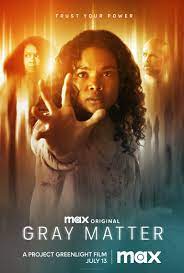
GRAY MATTER
US, 2023, 87 minutes, Colour.
Mia Isaac, Jessica Frances Dukes, Garrett Dillahunt, Andrew Liner.
Directed by Meko Winbush.
This is part of the Project Greenlight program, background to the film is in the television series. To that extent, this is an experimental film, an opportunity for a new director, Meko Winbush. It is a horror film about special powers, supernatural, in a special group of people. Given the central character, a teenage girl, African-American, this would seem to be principally a Young Adult drama.
The film opens with a sinister situation, a woman, Ayla (Jessica Frances Dukes) confronting a policeman after a chase, threatening, the policeman killing himself. Then a transition to 15 years later, the woman now with her daughter, Aurora (Mia Isaac), protecting her daughter, homeschooling, isolation, the young girl with powers and her mother training her to exercise them, to control them. But, the rebellious daughter does sneak out of the house and encounters an agreeable young man. She meets him again, with his friends, and a terrible situation arises, Aurora unable to control her powers, the death of the young man.
She goes into frenzy, unconsciousness, and is rescued by Derek (Gareth Dilllahunt) who also has the powers and knows all about Aurora and her mother. He offers to help – and most of the film is in Aurora’s consciousness, scenes from the past appearing, her trying to control her memories, to stop Derek entering into her consciousness. And her imagination takes various forms including the dead young man, her mother, all pleading with her to reveal where her mother is. Derek, initially kindly, seems all the more sinister. Ultimately, Aurora meets her mother and explains the truth, Derek accusing her of murders, her helping Aurora go back into the past and see that Derek was responsible and has been blaming the mother and pursuing her.
Which all builds up to a confrontational climax. In many ways slight, but an interesting initial exercise for the director, a film for younger target audience.
- The title? The brain? Gray areas of responsibility?
- The basic premise, people with special powers, the control, exercise, for good and ill?
- The opening, the chase, Ayla and the confrontation with the policeman, the threats, her control, his death?
- 15 years later, mother and daughter, the mother protecting her daughter, homeschooling, the teenage girl, exercising her powers, control? Continually on the move, her mother asking her to exercise the power on moving the box of books? Aurora and her reaction?
- Aurora, rebellious teenager, the watching of the television sitcom and its themes?
- Aurora slipping out, the encounter with the young man, friendly, slipping out again, the group playing, talking, the bond with the young man, her seizure, uncontrolled, the effect on the young man, his death?
- Aurora being rescued by Derek, her bewilderment, his offering to help? Trying to into her mind, Aurora blocking him? His wanting the whereabouts of her mother? Blame for murders?
- The core of the film with Aurora’s nightmares, the various locations, situations, appearances, her mother, the dead boy…? Their all asking the whereabouts of her mother? Aurora and her resistance? The characters appearing and disappearing, Derek and his continued questions?
- Aurora eventually meeting her mother, suspicious, her mother telling her the truth, revisiting the situation, Derek and the killings, blaming the mother?
- The buildup to the final confrontation with Derek, the visuals, the drama, the superpowers? And mother and daughter safe?



